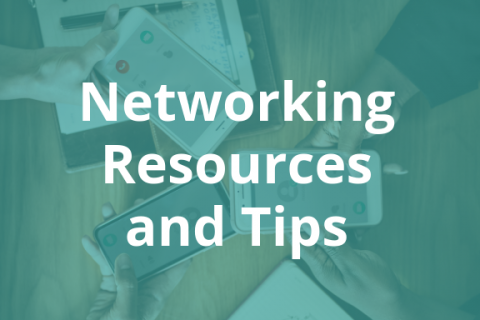Networking Resources and Tips
Networking is a mutually beneficial process that involves developing and maintaining professional connections. Networking provides you with an opportunity to connect with individuals in your field of interest that can provide beneficial insight, gather information pertaining to a particular field or industry, and increase your chances to find out about job openings otherwise not advertised. See below on ways to build your networking skills.
Networking Tips:
Check out the Networking and Elevator Pitch Tips handout. This resource is also available in a Microsoft Word document.
- Don’t speculate for a job
- Invest in relationships
- Make friends before you need them
- Seek advice, not help
- Give before getting
Where to get started:
- LinkedIn – connect & engage with alumni
- Smeal Career Service Interns – get career tips and advice from your peers
- Smeal Alumni Mentor Program – be paired with a Smeal Alumni for an entire year to build your network
Elevator Pitch Tips:
Check out the Networking and Elevator Pitch Tips handout. This resource is also available in a Microsoft Word document.
- Introduce yourself with your name, year, major, activities, and aspirations:
- Say something about your knowledge/interest in the company or an interesting fact
- Say something about what skills you can bring to the company or what you can believe you can offer them- make sure it matches what the company is looking for
- Ask an open-ended question that will encourage dialogue
If you are not pursuing a specific opportunity or you are an underclassman and the company is only pursuing juniors and seniors, as what you can be doing now to stand out in the recruiting process or what they look for in an ideal candidate.
Conduct Informational Interviews (conversations with professionals in career fields of interest to obtain advice and guidance about chosen industries)
- Research and educate yourself about specific career fields and industry trends
- Identify people who can best provide or lead to the information you hope to gain (see below for where to connect)
- Understand what you want to gain from the meeting and have questions prepared
- Take time to research the person’s organization, position, etc. so that you have a sense of what he/she does
- Send a “thank you” e-mail, notecard, or letter after the meeting
- Reiterate your gratitude for the time the individual took to meet with you
- Keep in touch as appropriate. When relevant, provide an update on how you are doing
Questions you might ask:
- What do you do on a “typical” day? What are the “typical” career paths in this field?
- What part of this job do you find most satisfying? What challenges you?
- What has been your career path and how did you get into your current position?
- What makes a person most marketable for positions in this field? What personal qualities or abilities are important to being successful in this job?
- What opportunities for advancement are there in this field and what is the current demand for people?
- In what ways is this field changing or growing? What issues are affecting the field, your position, or your organization?
- What special advice would you give someone entering this field?
- Which professional journals and organizations would help me learn more about this field?
- What suggestions do you have for me to enhance my background and/or resume?
- What are the general salary ranges for positions in this field and/or type of position?
- How would you describe your organization’s culture?
- With what other individuals should I speak to gain additional information?
Additional Resources:
- Professional Attire Tips. This resource is also available in a Microsoft Word document.
- The Forte Foundation: Networking for Women in Business
- Writing Thank You Notes- Video
- How to Market Your Study Abroad Experience
- How to Be Professional When Contacting Employers- Video
- Reframe the Way You Network- Video
- Learn How to Tell Your Story in 2 Minutes- Video
- Penn State Career Services: Career Information Center
- Meetaway – business networking platform designed to help hosts run virtual events and match attendees on one-on-one and many-to-many conversations

